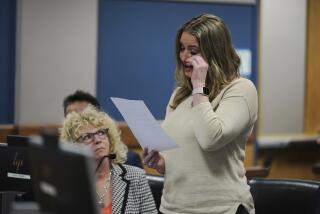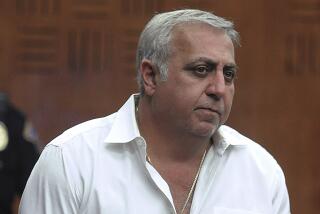Clinton’s Point Man Puts Himself ‘in Harm’s Way’
- Share via
WASHINGTON — It was a scant three weeks until election day 1996.
Bruce R. Lindsey, the White House lawyer and strategist devoted to ensuring President Clinton’s reelection, was tending a blooming embarrassment for the president: the influence of questionable, Asia-based supporters.
Specifically, Lindsey was asked by a reporter, what did the president discuss with one of those supporters, Indonesian tycoon James T. Riady, during a private White House meeting in September 1996?
“It was basically a drop-by social visit,” said Lindsey, who himself had attended. No issues of U.S. policy were discussed, he said, adding: “I’m not going to tell you what the meeting was about.”
It would not be until Nov. 4, 1996--just one day before the election--that other White House aides began to acknowledge that Clinton and Riady had indeed discussed matters of substance. These included Riady’s desire for the United States to renew most-favored-nation trading status with China, where the Riady family has sizable investments.
The political backlash came--but not until after the president was safely reelected.
For Lindsey, stalling emergence of the true, symbiotic nature of the Clinton-Riady relationship fit with his niche as protector-without-peer to the president. Whether the controversy is Whitewater, allegations of Clinton’s marital infidelity, the White House’s improper handling of FBI background files or the imbroglio over campaign fund-raising, Lindsey inevitably is the quiet man behind the scenes, trying to keep the lid on.
“The president relies as much on Lindsey as he relies on anybody in the world, other than Hillary,” said Bernard Nussbaum, who served as White House counsel from 1993 to 1994.
Misleading the news media or partisan opponents is hardly a rarity in Washington. But Lindsey’s delicate role continues to place him, in the words of Nussbaum, “in harm’s way.” Prosecutors in Little Rock, Ark., and congressional investigators are now exploring Lindsey’s monitoring of the Whitewater and Asian money controversies, and whether he has testified truthfully. He is certain to face further questioning under oath in coming weeks, according to people familiar with the inquiries.
Lindsey declined to be interviewed for this article.
Connections to Hubble Probed
Investigators want to know whether Lindsey was familiar with any effort to buy the silence of Webster L. Hubbell, the former law partner of First Lady Hillary Rodham Clinton who resigned in disgrace as associate attorney general. Hubbell had pledged to cooperate with the Whitewater independent counsel’s investigation of the Clintons as part of his own plea bargain after he was charged with defrauding his former law firm. But he later maintained that he could remember little about key Whitewater transactions that remain under scrutiny.
One possible problem for Lindsey is his own sworn testimony, delivered in a closed session on June 8, 1996--months before the extraordinary efforts by administration officials to help Hubbell financially had emerged.
“You are not aware of any efforts by anybody affiliated with the administration to try to get any work to Mr. Hubbell?” Senate Whitewater Committee counsel Robert J. Giuffra Jr. asked.
Said Lindsey: “No.”
By the spring of 1997, White House officials were forced to acknowledge that Clinton aides, administration officials and political supporters drummed up about a dozen paying engagements for Hubbell after he resigned in 1994, amounting to more than $500,000. In addition to the income, Clinton insiders helped establish trust funds for Hubbell’s children, along with a legal defense fund. A Riady-controlled company paid Hubbell at least $100,000.
According to people familiar with what happened in 1994, the efforts to get financial help for Hubbell or his family--involving Mickey Kantor, Thomas “Mack” McLarty, Erskine Bowles and other Clinton appointees and supporters--were an open secret within the highest levels of the White House.
Said one lawyer who has worked closely with Lindsey at the White House: “Knowing how the guy operates, knowing how that place operates, it’s difficult to imagine that he wasn’t aware of it.”
As the investigations proceed and information about the deals grows, the questions loom: What did Lindsey know and when did he know it? And how does that square with what he has said under oath?
Clinton’s Constant Hearts Partner
Lindsey’s indispensability to Clinton has been apparent since the 1992 campaign, when he was constantly at the candidate’s side. Then as now, Lindsey, 49, is apt to be the all-purpose “body man,” the person Clinton relies on to exchange messages with people outside his protective cocoon. He also is the president’s perennial hearts partner on Air Force One.
Lindsey’s upbringing and early professional experience helped prepare him for his role as the circumspect lawyer who keeps the Clintons’ secrets and faithfully executes their strategy. The son of a Little Rock lawyer, he joined his father’s firm and served its roster of corporate clients, helping them avoid or defend against labor- and discrimination-related lawsuits.
Clinton and Lindsey have known each other nearly 30 years. They met when both worked for Sen. J. William Fulbright, the venerable Arkansas Democrat who was a mentor of Clinton’s. Lindsey and Clinton also worked for about a year at the same law firm in Little Rock. Then and now, Lindsey is viewed as a confidant who eschews the limelight.
“He’s a fiercely loyal individual,” said former Arkansas Sen. David Pryor, whom Lindsey served as legislative director in Washington. “I think you can talk to Bruce about things you probably wouldn’t discuss with anyone else.”
Now, whether it’s Whitewater or the Asian money debacle, said one presidential advisor, “there’s a huge tug of war within the White House over whether to disclose and get [information] out early, or not at all. Bruce, by and large, if not universally, is of the view: ‘Don’t tell ‘em anything.’ ”
Other aides may voice their views to Clinton in freewheeling group conversations, but Lindsey usually imparts his advice privately. Still, Lindsey’s lower profile has not entirely shielded him.
Lindsey owes a Washington law firm that has represented him more than $250,000 in legal fees, according to his financial disclosure reports.
Last summer, Whitewater prosecutors named him an “unindicted co-conspirator” in a case against two Arkansas bankers who had supported Clinton. The prosecutors had alleged that Lindsey directed the pair to conceal large cash withdrawals, which he said were subsequently used to get out votes for Clinton’s 1990 reelection as governor. Lindsey vigorously denied the concealment allegation and the bankers were acquitted, effectively vindicating him.
However, the prosecutors in Little Rock and congressional investigators are continuing to explore Lindsey’s role in other aspects of the Whitewater and Asian money controversies, particularly those involving Hubbell.
In his testimony on Capitol Hill, Lindsey acknowledged keeping tabs from the White House on the Whitewater controversy, in which Hubbell became a figure. He said he did so in part through conversations with James B. Blair, an Arkansas lawyer who for years has done favors for the Clintons.
Lindsey also stayed in steady contact with Hubbell after Hubbell left the administration. Lindsey continued to talk to him--even after Hubbell pleaded guilty and pledged to cooperate with the ongoing Whitewater investigation.
And Lindsey also was in touch with the Riadys, who were among those who gave Hubbell a lucrative engagement after his resignation.
Lindsey told a Senate committee last year that in the fall of 1994 it was he who “killed” a plan by the Riady family to fly Hubbell and other Arkansans to Indonesia, coinciding with a visit there by Clinton. Having Hubbell and the others on hand, Lindsey recalled, was “a stupid idea” that would have invited unflattering attention.
When the president’s entourage arrived in Indonesia, “I explained it to Mr. Riady,” Lindsey testified, adding that he had suspected Hubbell was “doing some work” for the family.
It was Lindsey who conferred in 1994 with the Riadys’ top American executive, John Huang, about Huang’s interest in taking a position within the Commerce Department. And he participated in a September 1995 Oval Office meeting with Clinton at which Huang and Riady discussed Huang’s subsequent move to the Democratic National Committee to become a fund-raiser for the 1996 campaign. That meeting has attracted notoriety because Huang went on to raise more than $1.5 million in illegal or questionable contributions. He became the central figure in the current fund-raising controversy.
Lindsey was also familiar with Truman Arnold, a Texarkana, Texas-based oil marketer and major Democratic contributor who hired Hubbell. Lindsey attended an evening gathering of Texas Clinton supporters at Arnold’s house in July 1994--after getting a call at the White House from Hubbell urging him to go.
Lindsey Acquaintances Helped Out Hubble
It would not be until months after Lindsey’s confidential June 1996 testimony--in which he said he knew nothing of the administration-related help for Hubbell--that the breadth of those efforts began to emerge publicly. By spring 1997, it had been established that businessmen whom Lindsey knew, along with his close colleagues including then-White House Chief of Staff McLarty, had helped Hubbell.
Now, as he has throughout his 4 1/2 years in the Clinton administration, Lindsey lives in Washington apart from his wife, who has stayed in Little Rock. Their two children are away at college. Kantor, Clinton’s former Commerce secretary and chairman of the 1992 campaign, empathizes with the difficulties Lindsey must continue to face.
“I don’t know how anybody in that position with any president could ever insulate himself from criticism or controversy,” Kantor said. “Because [he’s] the person who has to take the bullet. And that’s just the way it is.”
(BEGIN TEXT OF INFOBOX / INFOGRAPHIC)
Profile: Bruce Lindsey
* Age: 49
* Birthplace: Little Rock, Ark.
* Education: Rhodes College (Tenn.), bachelor of arts, 1970; Georgetown University, law degree, 1975.
* Current title: assistant to the president and deputy White House counsel since 1994.
* Career: Legal counsel to the governor of Arkansas, 1975-76; legislative director to Sen. David Pryor, 1979-81; Clinton campaign director, 1991-92; assistant to the president, senior advisor and director of presidential personnel, 1993-94.
Source: Federal Staff Directory
More to Read
Get the L.A. Times Politics newsletter
Deeply reported insights into legislation, politics and policy from Sacramento, Washington and beyond. In your inbox twice per week.
You may occasionally receive promotional content from the Los Angeles Times.











